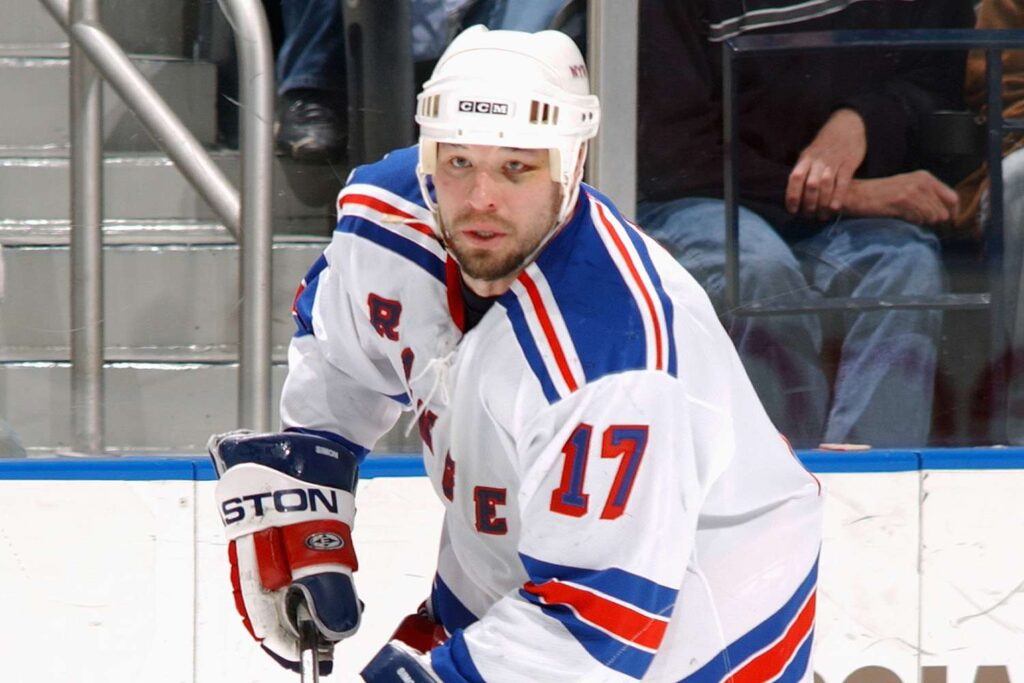- Player had been suffering from anxiety and depression
- Simon won Stanley Cup with Colorado Avalanche
Former NHL winger Chris Simon tragically passed away on Tuesday night, leaving behind a legacy both on and off the ice. His family has attributed his untimely death to chronic traumatic encephalopathy (CTE), a condition that has sparked widespread concern in the world of contact sports.
Simon, who was just 52 years old at the time of his death, is said to have taken his own life, a decision his family believes was heavily influenced by the brain trauma he endured throughout his career. CTE, a condition that can currently only be definitively diagnosed through a postmortem examination, is thought to have played a significant role in his struggles. However, it’s worth noting that researchers are making strides towards developing methods for diagnosing CTE in living individuals.
In a heartfelt statement released by Simon’s family, they shared, “The family strongly believes and witnessed first-hand, that Chris struggled immensely from CTE which unfortunately resulted in his death. It is with heavy hearts that we mourn the loss of our son, brother, father, partner, teammate and friend. The entire Wawa community, where Chris was deeply rooted, is sharing in our grief. At this point, we will not be releasing any further details and ask for privacy during this incredibly difficult time. We are profoundly grateful for everyone who shares in our tragic loss.”

The Canadian native left an indelible mark on the NHL, playing for seven different franchises over a career that spanned from 1992 to 2013. Beyond the NHL, Simon also showcased his talents in the KHL, predominantly based in Russia, further demonstrating his global impact on the sport. Simon was renowned for his physical and aggressive style of play, earning him a reputation as a formidable opponent on the ice. Yet, those who knew him well also celebrated him as a fiercely loyal teammate. His contributions to the sport culminated in the 1995-96 season when he played a pivotal role in securing the Colorado Avalanche their first ever Stanley Cup title, a triumph that remains a highlight of his illustrious career.
Chris Simon’s passing is a stark reminder of the potential long-term consequences of repeated head injuries in sports, sparking important conversations about player safety and the need for continued research into conditions like CTE.
Avalanche’s president, Joe Sakic, talked about how much of a great guy he was, both on and off the ice. He was a key player in their first championship season, known for scoring goals and standing up for his teammates. Plus, he was an incredible person and a caring dad, son, brother, and friend. Everyone’s going to miss him a lot.
The New York Islanders, one of his old teams, also remembered him fondly. They said he really showed what it means to be an Islander, with his heart always on display, both when playing and helping out in the community.
Chris had been married a couple of times and had five kids. Back in 2017, he had to file for bankruptcy because he couldn’t work anymore. He thought it was because of symptoms from CTE, which he believed came from major head injuries during his hockey days. A doctor even said he had anxiety and depression, which are signs of CTE.
The news about Chris came out the same day we heard about another former NHL player, Konstantin Koltsov, passing away in what looked like a suicide. Koltsov used to be with Aryna Sabalenka, the tennis star.
And just last week, there was this first confirmed case of CTE in a pro rugby player, Billy Guyton from New Zealand, who died at 33. They looked at his brain after he passed, over at the University of Auckland.
It’s pretty clear now, the only way to get CTE is through head injuries, which isn’t surprising with all the hits you take in sports like rugby, boxing, hockey, and football. Even a single bad accident, like a car crash, can cause it.
Facts about Chris Simon
- Born on January 30, 1972, in Wawa, Ontario, Canada
- Began his NHL career in 1992 with the Quebec Nordiques
- Won the Stanley Cup in 1996 with the Colorado Avalanche
- Played for seven NHL teams throughout his career, including notable stints with the Washington Capitals and New York Islanders
- Also played professional hockey in the Kontinental Hockey League (KHL) towards the end of his career
- Known for his physical style of play, accumulating over 2,000 penalty minutes across his NHL career
- Retired from professional hockey in 2013
- Struggled with mental health issues in the years following his career, believed to be symptoms of chronic traumatic encephalopathy (CTE)
- Was married twice and is survived by five children
- Filed for bankruptcy in 2017, citing inability to work due to health issues related to his hockey career
